
Best Running Poles: A Guide to the Top Picks for Trail and Ultra Running
Published on January 21 by Matt
Running poles have gained popularity among trail and ultra runners, offering a significant performance boost, improving efficiency, and reducing strain during long runs or challenging terrains. If you’re considering adding poles to your gear arsenal, it’s essential to choose the best ones that suit your specific needs. In this guide, we’ll explore the top running poles on the market, their benefits, and what factors to consider when selecting the ideal poles for your runs.
Why Use Running Poles?
Running poles, primarily used in trail running, hiking, and ultra running, can provide a number of benefits:
- Increased Stability and Balance: Poles help maintain stability on uneven or technical terrain, which can reduce the risk of falls and improve confidence, especially on steep ascents or descents.
- Enhanced Endurance: Poles allow you to distribute the workload across your whole body, which can reduce the strain on your legs and help conserve energy during long races or hikes.
- Improved Efficiency: Poles act as an extension of your arms, helping propel you forward, especially on uphill sections, thus improving your overall pace.
- Reduced Joint Strain: By engaging your upper body muscles, poles can take pressure off your knees and hips, making running on challenging surfaces or downhill less taxing on your joints.
With these benefits in mind, let’s dive into some of the best running poles available for athletes.
Top Running Poles for Trail and Ultra Runners
1. Black Diamond Distance Carbon Z
- Weight: 290g (per pair)
- Material: Carbon Fiber
- Collapsed Length: 37 cm
- Extended Length: 120-140 cm
The Black Diamond Distance Carbon Z poles are among the most popular running poles on the market, especially for those looking for a lightweight, high-performance option. Made from carbon fiber, these poles are incredibly light, yet strong and durable. The foldable Z-pole design allows for quick deployment and compact storage when not in use. The poles feature an ergonomic foam grip for added comfort and a reliable flick-lock mechanism for length adjustments.
Pros:
- Extremely lightweight
- Compact and easy to store
- Comfortable grip for long runs
- Reliable and durable construction
Cons:
- Carbon fiber can be more fragile than aluminum if subjected to excessive force
- Not adjustable for different terrain types (fixed length)
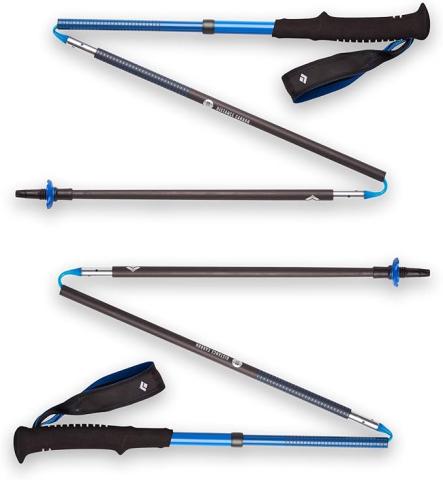
2. Leki Micro Vario Carbon
- Weight: 220g (per pair)
- Material: Carbon and Aluminum
- Collapsed Length: 36 cm
- Extended Length: 110-130 cm
Leki has built a solid reputation for producing durable, high-quality poles, and the Micro Vario Carbon is no exception. Featuring a carbon shaft, this pole combines lightweight performance with solid durability. Its quick-lock system allows for rapid adjustments on the go, making it ideal for ultra runners and those who need to change the pole length quickly as terrain conditions vary.
Pros:
- Extremely lightweight and durable
- Adjustable length with a reliable locking mechanism
- Comfortable, ergonomic grip
- Excellent for long-distance running
Cons:
- Expensive compared to other options
- Not as compact as other foldable poles
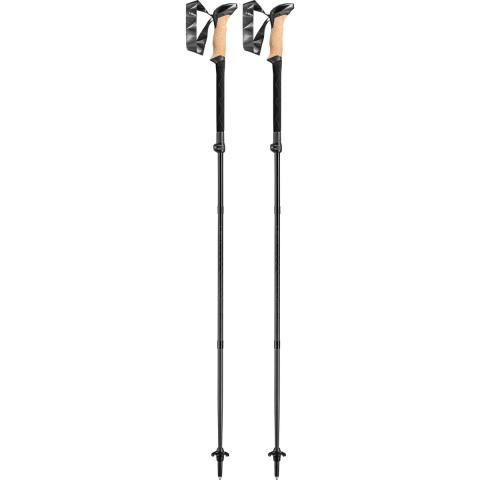
3. Black Diamond Alpine Carbon Cork
- Weight: 290g (per pair)
- Material: Carbon Fiber (Shaft), Cork (Grip)
- Collapsed Length: 40 cm
- Extended Length: 105-130 cm
For runners who prefer cork grips for added comfort and moisture-wicking properties, the Black Diamond Alpine Carbon Cork poles are a solid choice. These poles have a carbon fiber shaft for lightweight performance and a cork grip that provides excellent traction and reduces hand fatigue on long, sweaty runs. The poles feature a three-section design for adjustability, ensuring they work well for different types of terrain and conditions.
Pros:
- Comfortable cork grips that reduce hand sweat
- Adjustable and easy to use
- Lightweight and durable construction
Cons:
- Can be slightly bulkier than ultralight poles
- Some runners may prefer a more minimalist design
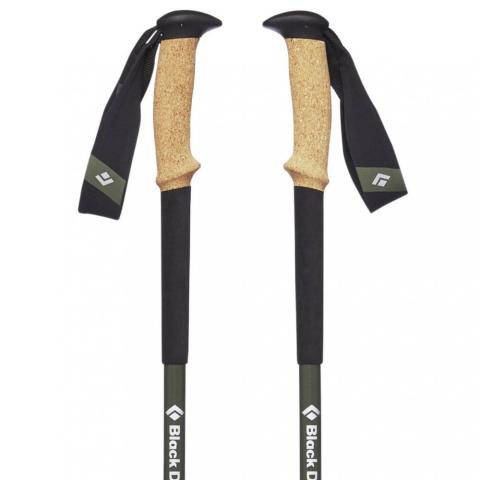
4. Cascade Mountain Tech Carbon Fiber Trekking Poles
- Weight: 290g (per pair)
- Material: Carbon Fiber
- Collapsed Length: 35 cm
- Extended Length: 115-135 cm
For those on a budget, Cascade Mountain Tech Carbon Fiber Trekking Poles offer an affordable yet high-performing option. The carbon fiber shafts keep the weight low while maintaining strength. The cork handles are comfortable, and the poles come equipped with adjustable locks that are reliable and easy to use. While not as lightweight as other premium options, they still offer excellent value for money.
Pros:
- Great value for the price
- Lightweight carbon fiber design
- Comfortable cork grips
- Adjustable locking system
Cons:
- The locking mechanism may require occasional maintenance
- Not as compact or fast-folding as premium models
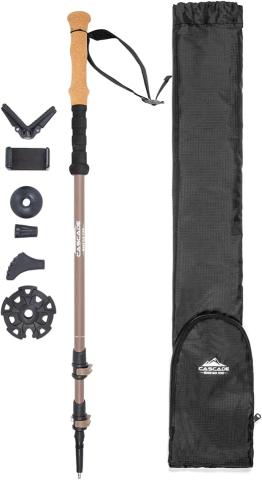
5. Komperdell Carbon C3
- Weight: 220g (per pair)
- Material: Carbon Fiber
- Collapsed Length: 38 cm
- Extended Length: 110-130 cm
Komperdell is another top brand in the trekking and running poles market, and the Carbon C3 poles are a great option for serious runners. Made from carbon fiber, these poles are incredibly light yet still provide a high level of durability. The poles are easily adjustable, and their comfortable foam grips make them suitable for long-distance runs, even in the hottest conditions.
Pros:
- Lightweight and durable carbon design
- Comfortable grip for extended use
- Quick-lock adjustment system
Cons:
- A bit more expensive than entry-level models
- Not as compact as foldable poles
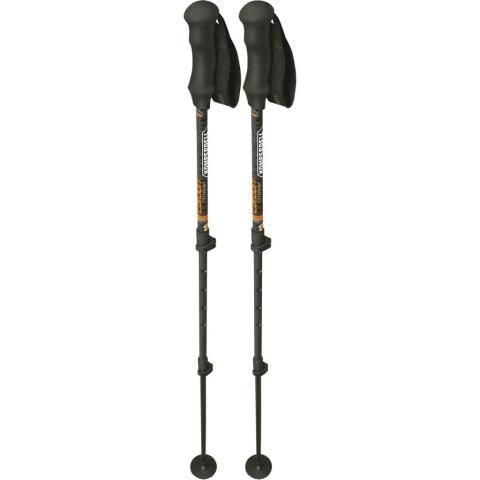
Factors to Consider When Choosing Running Poles
1. Weight
When it comes to running poles, weight is a key factor. Lighter poles make it easier to maintain a steady pace, especially over long distances. Carbon fiber poles tend to be the lightest but also the most expensive. If you’re racing or covering long distances, prioritizing weight can help you conserve energy.
2. Durability
While lightweight poles are crucial, they should also be durable enough to withstand the rigors of running on rugged terrain. Carbon fiber poles are lightweight but can be more prone to breaking under high stress, while aluminum poles are generally more durable but heavier.
3. Adjustability
The ability to adjust the length of your poles can be useful depending on the terrain. Fixed-length poles are lighter and simpler but less versatile. Adjustable poles provide flexibility for varying incline and decline.
4. Grip Comfort
A comfortable grip is important, especially for long runs. Foam, cork, and rubber grips are common options, each with its pros and cons. Cork grips offer good moisture wicking and comfort, while foam provides a soft feel that can reduce hand fatigue.
5. Compactness
If you need to store your poles during sections of the run, consider how easy they are to fold or collapse. Z-poles are especially compact and easy to stash, while traditional adjustable poles may be a bit bulkier.
6. Price
The price range for running poles can vary significantly. Premium carbon fiber poles can cost upwards of $150, while budget models may be available for around $50. Decide what your budget allows, but remember that investing in quality poles can save you in the long run, particularly if you run frequently.
Choosing the right running poles depends on your individual needs, running style, and the type of terrain you’ll be encountering. If you’re looking for lightweight, high-performance poles for trail running or ultra-distance races, the Black Diamond Distance Carbon Z or Leki Micro Vario Carbon are excellent options. For those on a budget, the Cascade Mountain Tech poles provide solid performance at a lower price point.
Remember to consider factors like weight, durability, comfort, and adjustability when selecting your poles, and always test them on varied terrain to ensure they’re the right fit for you. Happy trails!